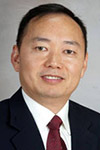
Yong Li
School of Medicine at Houston
University of Texas, USA
713.500.2348
Biography
Yong Li, is an Associate Professor within the Department of Pediatric Surgery at the University of Texas, School of Medicine at Houston. He also is appointed as an Associate Professor in the Center for Stem Cell and Regenerative Medicine at The Brown Foundation Institute of Molecular Medicine for the Prevention of Human Diseases (IMM) at The University of Texas Health Science Center at Houston. Dr. Li completed his MD and PhD training in China and was a general surgeon before he went to London in 1997. His first research position as a postdoctoral fellow was at the Imperial College School of Medicine in the UK (1997-1999), and later as a postdoctoral research associate at the Children’s Hospital of Pittsburgh of UPMC (1999-2002). He was promoted to a research assistant professor in 2002, assistant professor in 2004 (within tenure track system in 2006), and lead his research team to successful approaches in the field of stem cell and anti-fibrosis in regenerative medicine. These projects also include the enlargement and application of adult stem cells (muscle and skin) to repair traumatic injury (muscle, tendon, spinal cord and brain) and congenital diseases (DMD). They also began to study some projects such as the dedifferentiation process within skeletal muscle, cartilage and neuronal system of mammals and related aging research. As of 2011, Dr. Li has published over 66 refereed journal articles and review papers and five book chapters. He also serves as an associate editor or on the editorial board of five journals, and over five scientific communities including some grant reviewing boards. Dr. Li has won over twenty international awards for his scientific advances, including most recently, the Michael Miller Young Investigator Award at Children’s Hospital of UPMC. He is also a very successful grant-funded faculty member with grants from the National Institute of Health (NIH) and Department of Defense (DOD). He also is a great mentor and supervisor of students, medical residents and research fellows; several of his students and follows have won numerous national and international awards and scholarships including one student who won the 2011 National Goldwater Scholarship. Dr. Li is recognized as a leader in two scientific fields which include dedifferentiation related stem cell studies and fibrosis studies in tissue biomedical engineering. Within the newly established program in Children’s Regeneration Medicine at UTHealth, Dr. Li and his team has continual interest in investigating the fields of stem cells, fibrosis prevention and tissue engineering by using ground-breaking molecular and cellular biology techniques. Beside basic biomedical studies, Dr. Li will also conduct departmental projects in translational studies and clinical applications for utilizing stem cells and bioengineered tissues to repair congenital diseases of children such as diaphragmatic hernia and Duchenne muscular dystrophy (DMD).
Research Interest
Children’s Regenerative Medicine The project will use various cell sources combined with bioengineering scaffolds to build functional tissues for repair of pediatric defects, such as children’s diaphragmatic hernia Dedifferentiation and Stem Cell Populations The project aims to enlarge the stem cell pool without genetic modification as a cell source for regenerative medicine. Adult Embryonic Potential Stem Cells and Application Obtain natural embryonic potential stem cells from adult tissue for utilization in tissue engineering and regenerative medicine. Fibrosis and Prevention Studies Investigate the mechanism behind the fibrosis process after injuries and diseases, and seek methods for prevention of fibrous scar tissue formation
